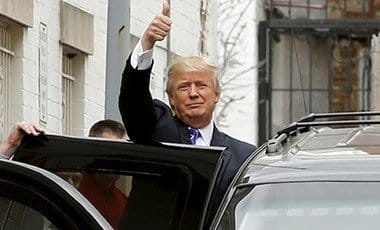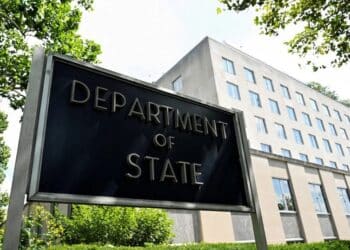DONALD Trump is poised to extend his lead in the Republican presidential race in a string of East Coast primaries on Tuesday, but a complicated contest in Pennsylvania, the day’s biggest prize, will test his recently reorganized campaign.
The state features the sort of complex rules that Trump has repeatedly slammed for being “rigged” and that forced him this month to reshuffle his team to better compete with main rival Ted Cruz for the 1,237 delegates needed to win the nomination for the Nov. 8 election.
“It’s as crooked almost as Hillary Clinton,” Trump said on Monday at a campaign event in West Chester, Pennsylvania, in an attack on both the Republican primary rules and the Democratic presidential front-runner.
Just 17 of the 71 Republican delegates up for grabs in Pennsylvania on Tuesday are allocated to the candidate who wins its primary. The rest – people who are elected directly by voters – are free agents, able to support anyone they choose at the Republican National Convention in July.
Pennsylvania and other states holding primaries on Tuesday – Maryland, Delaware, Rhode Island and Connecticut – are favorable terrain for Trump. Opinion polls show him leading in all five, prompting Cruz and John Kasich, the third Republican in the race, to announce an anti-Trump alliance.
On the Democratic side, Clinton also looks set to solidify her lead over U.S. Senator Bernie Sanders in Tuesday’s contests.
But Sanders, who has attacked Clinton from the left with pledges to do more than she would to address social inequality, insisted he stood a good chance to win some of the states. “I think we’ve got a path to victory and we’re going to fight this until the last vote is cast,” Sanders said on CNN.
Before polls opened, Trump continued battering the Republican delegate allocation system as rigged. “The whole delegate system is a sham,” he said on Fox News. The real estate magnate has lost the battle for delegates in some states where he won the popular vote.
On April 7, he announced he was reorganizing his campaign to focus on delegate and convention strategy, hiring advisers with convention experience, while railing against the Republican system.
In Pennsylvania, candidates hope to get as many die-hard supporters as possible elected as delegates, both to build support on the first ballot and to bolster their position if no one gets to 1,237 delegates outright and the Cleveland convention becomes a protracted fight for the nomination.
Source: Reuters











